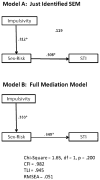Sexual risk-taking mediates the association between impulsivity and acquisition of sexually transmitted infections among hazardously drinking incarcerated women
- PMID: 23786513
- PMCID: PMC4896135
- DOI: 10.1111/j.1521-0391.2012.00296.x
Sexual risk-taking mediates the association between impulsivity and acquisition of sexually transmitted infections among hazardously drinking incarcerated women
Abstract
Background: A growing literature has identified associations between impulsivity and negative behaviors such as sexual risk-taking among high-risk and/or vulnerable populations, but few studies have linked impulsivity to biological outcomes of sexual risk-taking. The main purpose of this study was to document associations among impulsivity, sexual risk-taking, and biological measures of sexually transmitted infection (STI+) in a sample of hazardously drinking incarcerated women.
Methods: Two hundred forty-five hazardously drinking incarcerated women self-reported alcohol consumption and consequences, impulsivity, and sexual behavior.
Results: Biological testing revealed a 22.9% prevalence rate for STI+. In this sample, sexual risk-taking fully mediated the association between impulsivity and likelihood of STI+. In addition, individuals reporting sexual activity with multiple partners were significantly more likely to test STI+ than those reporting sexual activity with a primary partner.
Conclusion: These results support previous research on impulsivity by demonstrating that impulsivity leads to STI+ through risky behavioral choices. These findings also extend prior work by documenting this association using biologically confirmed measures in a vulnerable female population that carries multiple risk factors and thus warrants increased research attention.
Trial registration: ClinicalTrials.gov NCT00237003.
Copyright © American Academy of Addiction Psychiatry.
Conflict of interest statement
Figures
References
-
- Moeller FG, Barratt ES, Dougherty DM, Schmitz JM, Schwann AC. Psychiatric aspects of impulsivity. Am J Psychiatry. 2001;158:1783–1793. - PubMed
-
- Moeller FG, Dougherty DM. Impulsivity and substance abuse: What is the connection? Addict Disord Their Treatment. 2002;1:3–10.
-
- Cooper ML, Agocha VB, Sheldon MS. A motivational perspective on risky behaviors: The role of personality and affect regulatory processes. J Pers. 2000;68:1059–1088. - PubMed
-
- Love SR. Illicit sexual behavior: A test of self-control theory. Deviant Behav. 2006;27:505–536.
Publication types
MeSH terms
Associated data
Grants and funding
LinkOut - more resources
Full Text Sources
Medical


